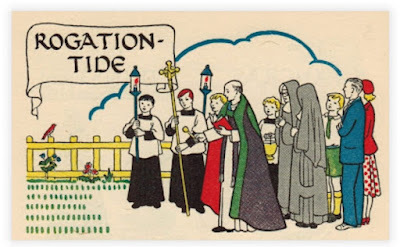6 Easter

RogationSunday
May25, 2025
John 14:23-29
+ 11 years ago tomorrow—on Sunday, May26, 2014—we did something special at our Rogation Blessing.
On that Sunday eleven years ago we processedout to our overgrown labyrinth and that bare patch of lawn under the tree thereand dedicated and blessed the space for ourMemorial Garden.
Before that, it was a somewhatforgotten corner of our property.
We used to have a composting bin there,where we would put our composting.
No one even really noticed it at ll.
And now, look!
Thanks to Sandy Holbrook and thegardening committee and all the people who have worked for that garden and allthat beautiful landscaping that was done there, it has become a place ofbeauty.
And in these eleven years, our memorialgarden has become a place of rest for 25 people—and a place of consolation forcountless others.
When I first proposed a memorial gardenfor St. Stephen’s, I remember people being resistant.
I got weird looks when I firstmentioned it.
And there were some people who wereoutright vocal in their opposition for such a thing.
But your loyal priest persisted.
(As he does!)
And he was diligent.
If, one day, when I shed this mortalcoil, I believe those two words will definitely be used to describe the rectorof St. Stephen’s.
Persistent and diligent.
(along with maybe a few other choicewords)
Well, this persistent and diligentpriest went out and did his research.
I visited memorial gardens in otherplaces.
I learned how such things were done.
And I learned also about an apostolateof St. Timothy’s Episcopal Church in Winston-Salem, North Carolina called theSociety of St. Joseph of Arimathea.
They were a group who provided burialsfor unclaimed babies in their church cemetery.
I wanted to make sure that anyone whoneeded a dignified burial had one in our memorial garden, that no one would beturned away because of financial difficulties, or for any other reason.
I remember a dear friend of mine atanother church who was faithful in in her duties to that congregation.
As she was preparing for her ownpassing, she decided she wanted to be interred in the church’s columbarium.
But the price tag to do so was a bitsteep for her.
I went to the priest and said, “She hasbeen very faithful to this congregation. She has volunteered and been there foreverything she is needed for. Just give her the niche.”
And that priest said no to me, and tothat elderly woman.
She finally was able to muster themoney together (due to some help from some of her friends) and her ashes now restthere in peace.
But the story struck me.
I never wanted anyone to struggle intheir own lives to find a place of dignity for their final resting place.
That is why I am so grateful for ourmemorial garden, and for all those who made this place what it is not only forus, but for everyone else who has benefitted from it.
Now I don’t think I’m overestimating itwhen I say it has also become a place of mercy.
We of course have laid people to restthere who had no other place to rest, who were rejected or forgotten.
Why? Why do we do that?
Because that is what we do asChristians.
In our Christian tradition, mercy playsheavily into what we do.
And as a result, there have been, sincethe early Church, a series of what have been called corporal acts of mercy.
I’ve talked about this many timesbefore.
These corporal acts of mercy are:
To feed the hungry; To give drink to the thirsty; To clothe the naked; To harbor the harborless; To visit the sick; To ransom the captive; To bury the dead.
We at St. Stephen’s, inthe ministry we do as followers of Jesus, have done most of those well(actually I don’t know if we’ve ransomed a whole lot of captives)
Including that last one.
Burying the dead is a corporal act ofmercy.
And, it’s appropriate we are discussingthings like mercy and love on this Sunday, Rogation Sunday, the Sunday beforethe Ascension of Jesus.
In our Gospel reading for today we findJesus explaining that although he is about to depart from his followers—thiscoming Thursday we celebrate the feast of Jesus’ Ascension to heaven—he willnot leave them alone.
They will be left with the Advocate—theSpirit of Truth.
The Holy Spirit.
He prefaces all of this with thosewords that quickly get swallowed up by the comments on the Spirit, “If you loveme, you will keep my commandments.”
And just to remind everyone, thatcommand is, of course, “to love.”
To love God.
And to love our neighbors as ourselves.
This is what it means to be the Church.
To love.
To serve.
To be merciful.
To be Christ to those who need Christ.
To be a Christ of love and compassionand acceptance.
Without boundaries.
Without discrimination.
Because that is who Christ is to us.
Our job as Christians, as followers ofJesus, is to show mercy to others.
We are doing so this morning.
We are living into our ministry ofmercy to others.
Today is, as I’ve said, RogationSunday.
Rogation comes from the Latin word“Rogare” which means “to ask.”
In our Gospel reading today we hearJesus saying to us,
“I will ask the Father, and he willgive you another Advocate…”
From a very simple perspective, thething we are asking today, on this Rogation Sunday, is to be faithful followersof Jesus, thorough our works and acts of mercy.
Now for some of us, this whole idea ofRogation Sunday and the procession that we will soon be making outside at theconclusion of our Eucharist this morning might seem a bit too much.
The fact is, it is something, very much likeburying the dead on the church grounds.
Our memorial garden—this visible signof the final corporal act of mercy—is a part of this Rogation celebration.
This is where we do our blessing.
We process there. In this procession,we will bless the earth and the land.
We will bless our new pocket prairie.
We ask God’s blessings on the growthnot only of crops and fields.
We also thank God today for the growthof our congregation.
We are thanking God for the acts ofmercy and grace done to each of us.
And we are asking God to continue tomake us Christ to those who need Christ.
We are thanking God especially for allthe graces in our lives.
Grace is especially something wecelebrate on Rogation Sunday.
Let’s see if you can remember mydefinition of grace.
Grace, in my very simple opinion, is agift we receive from God that we don’t ask for.
In fact it is often something wereceive from God that we may not even known how to ask for.
And we all get to be reminded of thefact that God’s grace still works in our midst in wonderful and beautiful ways.
This is how God works sometimes in ourlives.
And we have provided grace to severalof the people buried in our garden.
We gave them something they could notask for.
But we, seeking to live out mercy inour lives and in ministries here, provided them something others did not.
It is appropriate to remember all ofthis on this Rogation Sunday—this Sunday in which we ask God’s blessings on us,on the growth in our lives, and on the renewal in our lives, and in which weseek to be grateful for the graces in our own lives.
As we process out at the end of the Eucharisttoday, I ask you to look around at thememorial garden before and even as we head on to the Mary Garden at the back ofthe church.
I ask you to look at the names on thestones there.
We know many of them now.
Others of them we will never know onthis side of veil.
I ask you as you walk about to thankGod for them.
I ask you today to thank God for thegrowth God has granted us at St. Stephen’s.
And I ask that you remember Jesus’ callto us, to love God and to keep that commandment of love and mercy.
This is more than just sweet, religioustalk.
It is a challenge and a true calling tolive out this love in radical ways.
It is a challenge to be merciful.
As we process—especially as we blessour two pocket prairies—as we walk together, let us pay attention to this worldaround us.
Let us ponder the causes and theeffects of what it means to be inter-related—to be dependent upon on each tosome extent, as we are on this earth.
We do need each other.
And we do need each other’s love.
We definitely need each other.
And we definitely need more mercy inthis world.
We do need that radical love that Jesuscommands us to have.
With that love, we will truly love ourneighbors as ourselves.
We will truly show mercy to them.
Let this procession today truly be a"living walking" as the great poet (and one of my heroes) GeorgeHerbert put it.
But let our whole lives as Christiansbe also a “living walk,” a mindful walk, a walk in which we see the worldaround with eyes of love and respect and justice and care.
And, most importantly, with eyes ofmercy.
Amen.



